
A number of Unisan staff members donned graduation gowns in 2016 and received doctoral degrees from various institutions, including Unisa. Those who have walked this path will know that it’s never easy but the reward is always sweet. Here are just some of the many staff members who are excited to share this academic achievement with the Unisa community.
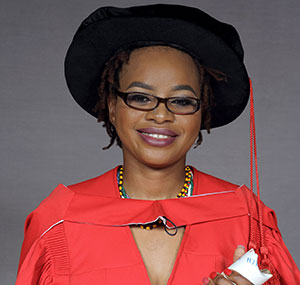 Dr Patricia Lindelwa Rudo Makoni, from the Department of Finance, Risk Management and Banking, received her doctoral degree from the University of Witwatersrand on 6 December. Her thesis was entitled ‘The Role of Financial Market Development in Foreign Direct Investment and Foreign Portfolio Investment in Selected African Economies’. “The attainment of my PhD is affirmation that hard work pays off. Not only did I get my PhD in 2016, but I also concurrently did it while undergoing my sangoma training, which was very demanding. The attainment of my PhD is a gift from, and to, my ancestors. I was granted 3 years study leave under the Unisa academic qualification improvement programme (AQIP) from 2014-2016. I am now Dr in the academic world, and ‘Mbuya/ Gogo’ in the sangoma world. Both qualifications are my greatest and proudest achievements yet. I look forward to using both gifts simultaneously,” she said. Dr Patricia Lindelwa Rudo Makoni, from the Department of Finance, Risk Management and Banking, received her doctoral degree from the University of Witwatersrand on 6 December. Her thesis was entitled ‘The Role of Financial Market Development in Foreign Direct Investment and Foreign Portfolio Investment in Selected African Economies’. “The attainment of my PhD is affirmation that hard work pays off. Not only did I get my PhD in 2016, but I also concurrently did it while undergoing my sangoma training, which was very demanding. The attainment of my PhD is a gift from, and to, my ancestors. I was granted 3 years study leave under the Unisa academic qualification improvement programme (AQIP) from 2014-2016. I am now Dr in the academic world, and ‘Mbuya/ Gogo’ in the sangoma world. Both qualifications are my greatest and proudest achievements yet. I look forward to using both gifts simultaneously,” she said. |
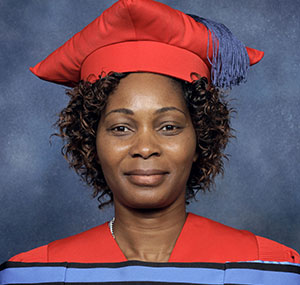 Dr Edinah Mudimu, from the Department of Decision Sciences, received her doctoral degree from Unisa on 6 September. Her thesis was entitled ‘On Modelling the transmission of the Human Immunodeficiency Virus (HIV) in a closed mixed society’. “I am extremely grateful that I have accomplished what I have always dreamt of. Obtaining a PhD is a dream that has come true for me. I would like to thank my employer Unisa, for affording me the opportunity to pursue my dream by investing time and resources in me. Special recognition goes out to my family for their encouragement support and patience during the pursuit of my doctorate. Without family support I would not have managed to obtain my doctorate,” she said. Dr Edinah Mudimu, from the Department of Decision Sciences, received her doctoral degree from Unisa on 6 September. Her thesis was entitled ‘On Modelling the transmission of the Human Immunodeficiency Virus (HIV) in a closed mixed society’. “I am extremely grateful that I have accomplished what I have always dreamt of. Obtaining a PhD is a dream that has come true for me. I would like to thank my employer Unisa, for affording me the opportunity to pursue my dream by investing time and resources in me. Special recognition goes out to my family for their encouragement support and patience during the pursuit of my doctorate. Without family support I would not have managed to obtain my doctorate,” she said. |
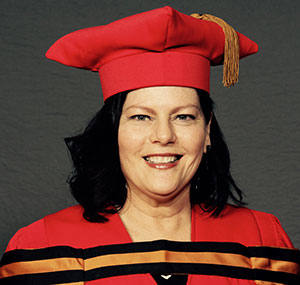 Dr Gwenneth Miller, from the Department of Art History, Visual Arts and Musicology, received her doctoral degree from Unisa on 17 October. Her thesis was entitled ‘Modelling an innovative approach to intermediality within Visual Art practice in South Africa’. “I feel humbled by this journey travelled along so many colleagues and friends who encouraged and supported me. I am very thankful to Unisa for the critical readers they made available and the international support this brought to our institution. I already have doctoral students lined up whom I hope I can inspire to grow as much as I did. The doctoral degree is not just an academic achievement, but a personal rite of passage,” she said. Dr Gwenneth Miller, from the Department of Art History, Visual Arts and Musicology, received her doctoral degree from Unisa on 17 October. Her thesis was entitled ‘Modelling an innovative approach to intermediality within Visual Art practice in South Africa’. “I feel humbled by this journey travelled along so many colleagues and friends who encouraged and supported me. I am very thankful to Unisa for the critical readers they made available and the international support this brought to our institution. I already have doctoral students lined up whom I hope I can inspire to grow as much as I did. The doctoral degree is not just an academic achievement, but a personal rite of passage,” she said. |
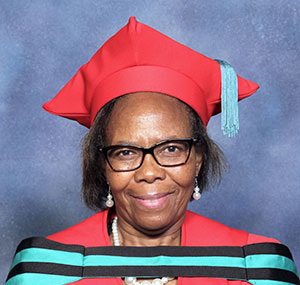 Dr Lineo Rose Johnson from Adult Basic Education and Training and Youth Development, received her doctoral degree from Unisa on 31 March. Her thesis was entitled ‘Offenders’ perceptions of correctional education programmes in the correctional facilities of Tshwane’. “A common saying in Africa, ‘I am the first’ in my family to graduate as a doctor. At my age, I give credit to lifelong learning. The journey has not been easy but determination and hard work has brought me this far. This achievement is a start of a long academic journey. I see it as opening doors to a very challenging discourse,” she said. Dr Lineo Rose Johnson from Adult Basic Education and Training and Youth Development, received her doctoral degree from Unisa on 31 March. Her thesis was entitled ‘Offenders’ perceptions of correctional education programmes in the correctional facilities of Tshwane’. “A common saying in Africa, ‘I am the first’ in my family to graduate as a doctor. At my age, I give credit to lifelong learning. The journey has not been easy but determination and hard work has brought me this far. This achievement is a start of a long academic journey. I see it as opening doors to a very challenging discourse,” she said. |
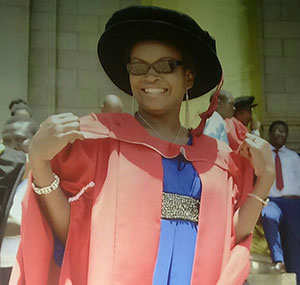 Dr Temitope Lydia Leshoro, from the Department of Economics, received her doctoral degree from the University of the Witwatersrand in December. Her thesis was entitled ‘Inflation Dynamics in South Africa’. “Obtaining this degree has not only changed the way I view academia, but the way I view life in general. No level of education is unachievable as long as we set our minds to it. I was privileged to be granted 11 months of research and development leave for the completion of the degree and I am forever grateful to Unisa for that. With just about five years, many ups and downs, challenges and goals that seemed impossible, I completed my degree and now I can sleep without having to run regressions or review articles in my sleep. This doesn’t mean the end of anything, in fact it is only the beginning of higher level of challenges and higher goals,” she said. Dr Temitope Lydia Leshoro, from the Department of Economics, received her doctoral degree from the University of the Witwatersrand in December. Her thesis was entitled ‘Inflation Dynamics in South Africa’. “Obtaining this degree has not only changed the way I view academia, but the way I view life in general. No level of education is unachievable as long as we set our minds to it. I was privileged to be granted 11 months of research and development leave for the completion of the degree and I am forever grateful to Unisa for that. With just about five years, many ups and downs, challenges and goals that seemed impossible, I completed my degree and now I can sleep without having to run regressions or review articles in my sleep. This doesn’t mean the end of anything, in fact it is only the beginning of higher level of challenges and higher goals,” she said. |
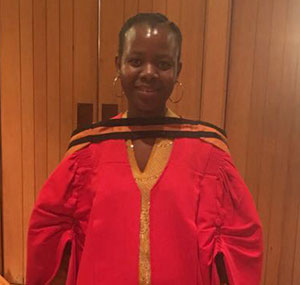 Dr Modjadji Linda Shirindi, from the Department of Social Work, received her doctoral degree from the University of Limpopo on 21 September. Her thesis was entitled ‘Social, economic and health challenges of women living in rural areas suffering from hypertension: the case of Dikgale communities’. “I am thankful. The journey I travelled has boosted my confidence. I learned to persevere and to accept constructive criticism in a positive way in order to improve. I benefited immensely as I developed a repertoire of research knowledge, as to the application of empirical research. This has improved my professional growth and development as a researcher and an academic. My mission is to impart research knowledge and skills to master’s and doctoral candidates, and to collaborate with colleagues on a number of research endeavours. This will further increase my publications in accredited peer-reviewed journals and thus improve my academic profile,” she said. Dr Modjadji Linda Shirindi, from the Department of Social Work, received her doctoral degree from the University of Limpopo on 21 September. Her thesis was entitled ‘Social, economic and health challenges of women living in rural areas suffering from hypertension: the case of Dikgale communities’. “I am thankful. The journey I travelled has boosted my confidence. I learned to persevere and to accept constructive criticism in a positive way in order to improve. I benefited immensely as I developed a repertoire of research knowledge, as to the application of empirical research. This has improved my professional growth and development as a researcher and an academic. My mission is to impart research knowledge and skills to master’s and doctoral candidates, and to collaborate with colleagues on a number of research endeavours. This will further increase my publications in accredited peer-reviewed journals and thus improve my academic profile,” she said. |
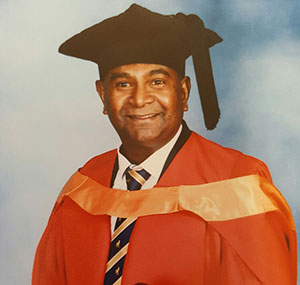 Dr Barnes Sookdeo, from the Department of Operations Management, received his doctoral degree from the North West University on 22 April. His thesis was entitled ‘The Application of Work Study Methodologies: Towards the Development of an Efficiency Reporting System for Manufacturing Organisations in South Africa’. “I see this accomplishment as a significant achievement in my career path as an academic. Despite the challenges, I am deeply appreciative for the incredible support from all those who had a role to play in me turning my dream into reality. I am hopeful that my achievement will contribute to my discipline, my department and to Unisa and I truly wish that I can be an inspiration to others to reach their full potential,” he said. Dr Barnes Sookdeo, from the Department of Operations Management, received his doctoral degree from the North West University on 22 April. His thesis was entitled ‘The Application of Work Study Methodologies: Towards the Development of an Efficiency Reporting System for Manufacturing Organisations in South Africa’. “I see this accomplishment as a significant achievement in my career path as an academic. Despite the challenges, I am deeply appreciative for the incredible support from all those who had a role to play in me turning my dream into reality. I am hopeful that my achievement will contribute to my discipline, my department and to Unisa and I truly wish that I can be an inspiration to others to reach their full potential,” he said. |
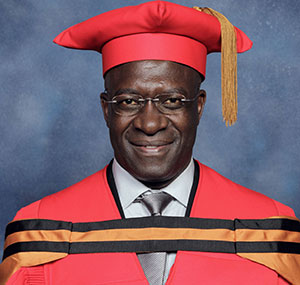 Dr Ximbani Eric Mabaso, from the Department of African Languages, received his doctoral degree from Unisa on 20 September. His thesis was entitled ‘Nkomiso eka Xitsonga: Nxopaxopo wa Ntivoririmi’ (The shortened Form in Xitsonga: A Linguistic Analysis). “Completing my studies required a lot of hard work and discipline. I wrote my thesis in my indigenous mother tongue (Xitsonga) in order to prove that this language can perform at a high academic level and that its function should not be relegated to church and funeral speeches only. This is only a drop in the process of decolonisation and hope that it will make a difference by empowering this language. I feel very proud to have had the opportunity to contribute to terminology development in a technical linguistic field in an era when reliable electronic corpus is critical for further research purposes. It feels like the beginning of more challenges in my endeavour to publish papers from this study. I hope to stay inspired,” he said. Dr Ximbani Eric Mabaso, from the Department of African Languages, received his doctoral degree from Unisa on 20 September. His thesis was entitled ‘Nkomiso eka Xitsonga: Nxopaxopo wa Ntivoririmi’ (The shortened Form in Xitsonga: A Linguistic Analysis). “Completing my studies required a lot of hard work and discipline. I wrote my thesis in my indigenous mother tongue (Xitsonga) in order to prove that this language can perform at a high academic level and that its function should not be relegated to church and funeral speeches only. This is only a drop in the process of decolonisation and hope that it will make a difference by empowering this language. I feel very proud to have had the opportunity to contribute to terminology development in a technical linguistic field in an era when reliable electronic corpus is critical for further research purposes. It feels like the beginning of more challenges in my endeavour to publish papers from this study. I hope to stay inspired,” he said. |
Publish date: 2017-02-13 00:00:00.0